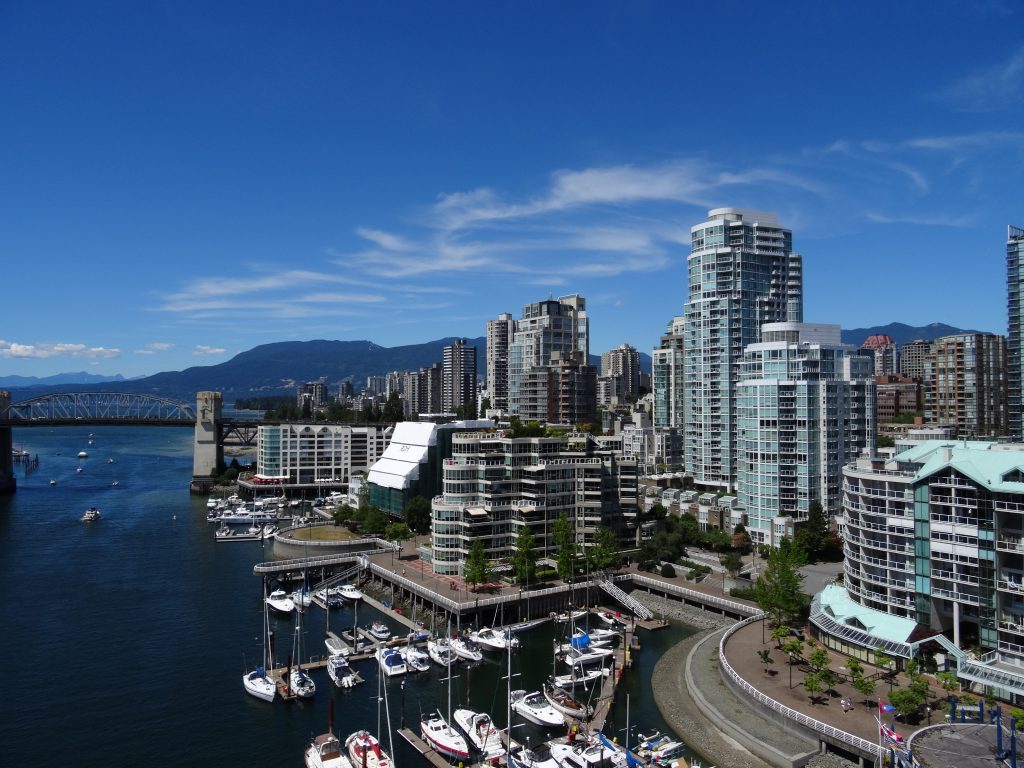You’ve come here because you’re itching to know more about moving to Vancouver. And you’re in luck because, in this blog post, I’ll give you the lowdown on work visas for Canada, how to find a job, and how to find a place to live.
We lived in Vancouver for two years, and what a time we had. It’s one of the most beautiful cities in the world – I mean, you’ve got the beach, the mountains, and the fantastic Stanley Park on your doorstep here. What we loved the most about living in Vancouver was how friendly the locals are and how easy we could get out into nature from the CBD.
Read on how you can make your dream of moving to Vancouver a reality!
Is Vancouver worth moving to?
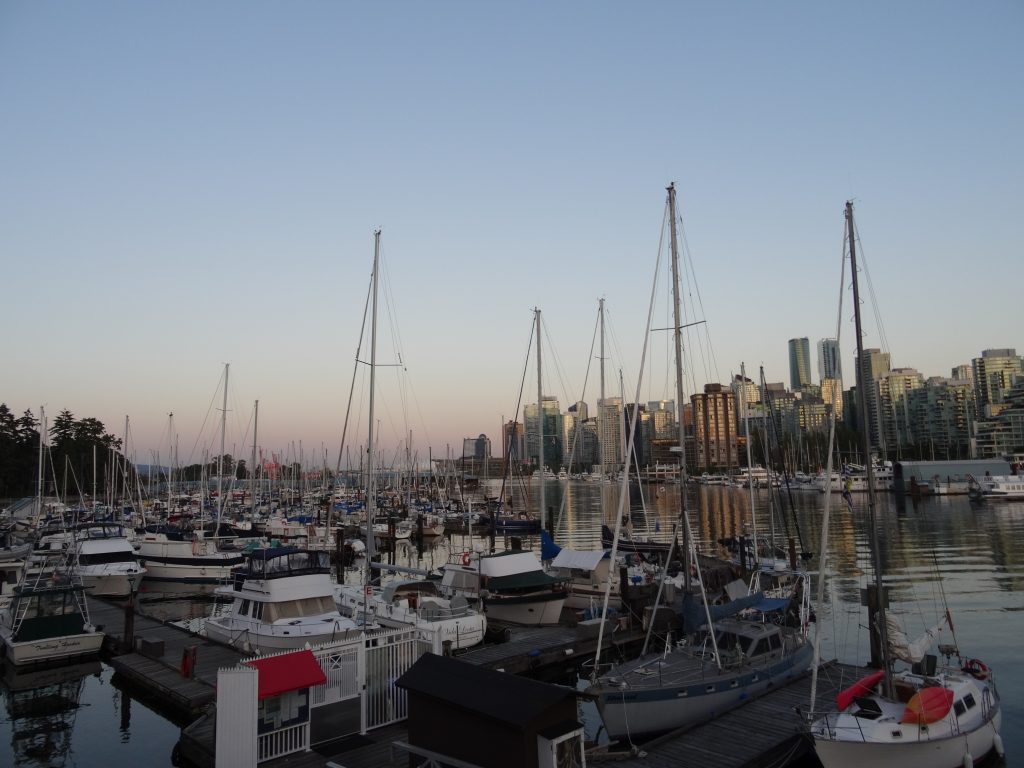
Yes, moving to Vancouver is 100% a good idea. But, there are things you need to keep in mind before you move so that you don’t end up disappointed.
Vancouver is one of the most beautiful cities in the world, backed by the North Shore Mountains, and with the beach and the incredible Stanley Park within walking distance from downtown, it’s no wonder this city is adored by everyone who visits.
The metro area of Vancouver has a population of 2.6 million people and despite it’s large size, it’s considered a safe city to live. In fact, Vancouver is regularly included in the top 10 most liveable cities in the world!
If you can earn the right wage, the lifestyle you can experience in Vancouver really is world-class – it’s quite a relaxed city and many residents spend their free time doing outdoorsy activities like hiking or skiing in the winter (one of the best ski resorts in the world, Whistler, is nearby!) There’s also a fantastic food and nightlife scene in Vancouver.
However, Vancouver is an expensive city to live – so earning a good salary (above $50,000 CAD) is essential to experience the best of the city.
What wage do you need to live in Vancouver?
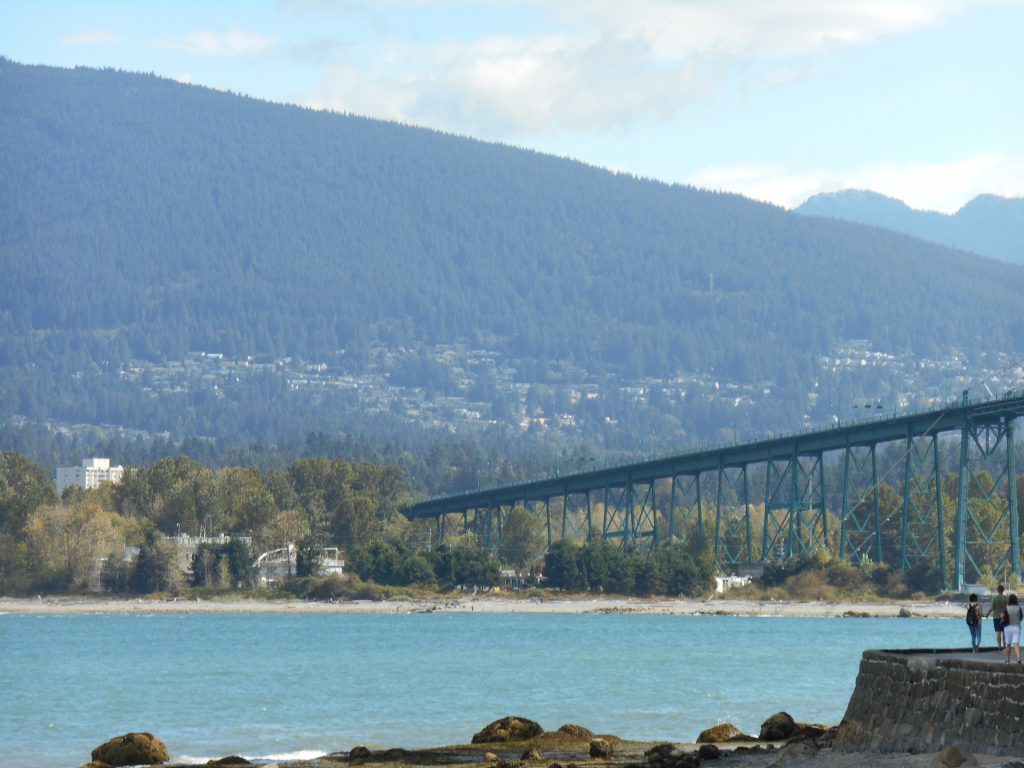
I would say that you need to earn a minimum salary of $50,000 CAD to live comfortably in Vancouver.
To put it plainly, Vancouver is an expensive city – it’s currently listed as the most expensive city in Canada. But, it’s also consistently rated as one of the best cities to live in the world for quality of life!
A person’s average monthly expenses in Vancouver is $3,100 CAD and that includes rent, food, utilities, etc. The average person’s salary in Vancouver equates to just under $70,000 CAD per year or around $35 CAD per hour. This may sound like a lot but when you factor in the fact that a one-bedroom apartment in the city will set you back $2,500 – $3,000 CAD a month – it’s easy to see how your wages can dwindle away quickly.
That’s why moving to Vancouver with a decent chunk of savings (we recommend a minimum of $7,000 CAD) is so important. As it’s very unlikely that you’ll be earning the average salary for the first year.
As I said above, rent will be your most costly outgoing
Rent, as you can imagine, is the most expensive outgoing cost for most people, with the average one-bedroom apartment in the CBD going for $3,000 CAD per month; of course, the further away you go from the city, the cheaper rent will become. Some of the cheapest neighborhoods to rent in Vancouver include Guildford, Langley and Surrey.
Buying groceries in Vancouver, I found it surprisingly expensive for fresh produce as well as that cheese and chicken are randomly very pricey. No Frills and Buy-Low Foods are two of the cheapest supermarket chains in Vancouver.
Is it difficult to move to Vancouver?
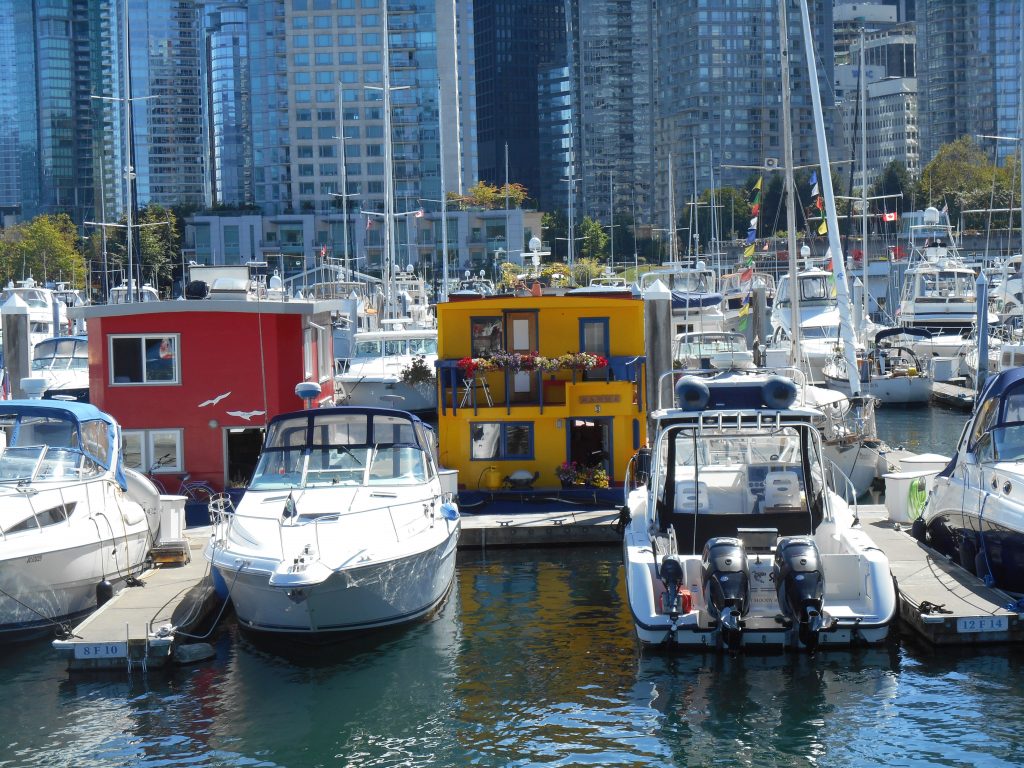
For the average person, you will need to apply for a work visa before moving to Vancouver. If you are lucky enough to have Canadian ancestry or are married to a Canadian, then the process will be much easier.
There are a couple of work visas available for Canada, these include temporary work visa, for agricultural workers and, for caregivers. You also may be able to get an intra-company transfer if you’re current place of employment has an office in Canada.
But, a Working Holiday Visa is the easiest way to gain entry to Canada, provided you meet certain requirements. It’s called the IEC Working Holiday Visa and here’s how to be accepted to the IEC program –
- You must be a citizen of one of these countries
- And be aged between 18 – 35
- Have a valid passport for the entire duration of your stay in Canada, so if your passport expires a year after entering Canada, that’s only how long your visa will be. Ensure you have at least 3 years left on your passport at the application stage.
- You must have a recent bank statement proving that you have $2,500 CAD, you will typically only be asked for this on landing in Canada.
Note – You must have private health insurance for the entire length of your visa. I recommend True Traveller
Check out other work permits available in Canada here!
How to get a working holiday visa for Canada
Step one –
- Complete the Come to Canada questionnaire. If you meet the criteria, you’ll receive a personal reference code.
- Enter this code to create your IRCC account
- Fill in your IEC profile.
- Submit your profile and choose the IEC pool(s) you want to be in. For example, ‘Ireland: Young Professionals’ is an example of a pool.
Then, it’s a case of waiting to be selected, as you’ll need to receive an Invitation to Apply (ITA) to continue the process. It’s a frustrating wait as the numbers in the pool can greatly exceed the number of permits available.
If you receive an ITA, you have 10 days start your application for a working holiday visa in Canada.
Step two –
- As soon as you press the ‘Start Application’ button to formally accept the ITA, you’ll have 20 days to submit your work permit application and pay any relevant fees.
- Gather and upload all the documents (e.g. police or medical certificates) requested by IRCC. If you don’t have these immediately, you can upload proof that you’ve applied for a police cert or medical exam (additional charges for these).
- Pay relevant fees. To get a Working Holiday Visa in Canada, it will be necessary to pay a participation fee of $172 CAD, and an open work permit holder fee of $100 CAD.
- IRCC will assess your application and may request additional documents.
If your application is a success, a letter of introduction (LOI) will be sent to your account. Bring this with you on your journey to Canada as you’ll need to present this to an immigration officer at a Port of Entry (POE), such as an airport or border crossing. This is where you’re provided with a work permit.
How much money will I need to move to Vancouver?
I recommend moving to Vancouver with a minimum of $7,000 CAD saved. That will get eaten up quickly with your rental deposit (half a month’s rent) and your first months rent which you need to pay ahead of time.
Is Vancouver friendly to immigrants?
I would say that, yes Vancouver is friendly to immigrants. It’s consistently ranked as one of the best cities to live in the world and that’s not just because of its great career opportunities it’s also because of the local Vancouverites’ friendly nature.
We found the locals to be super friendly and welcoming but it can be difficult to get into a friendship group here. I always thought this was because there’s a high number of expats living in the city and many expats are there for a short period of time. So, locals are wary of forming friendships with someone who may only stick around for a few months. That’s understandable, I think!
Finding a job in Vancouver
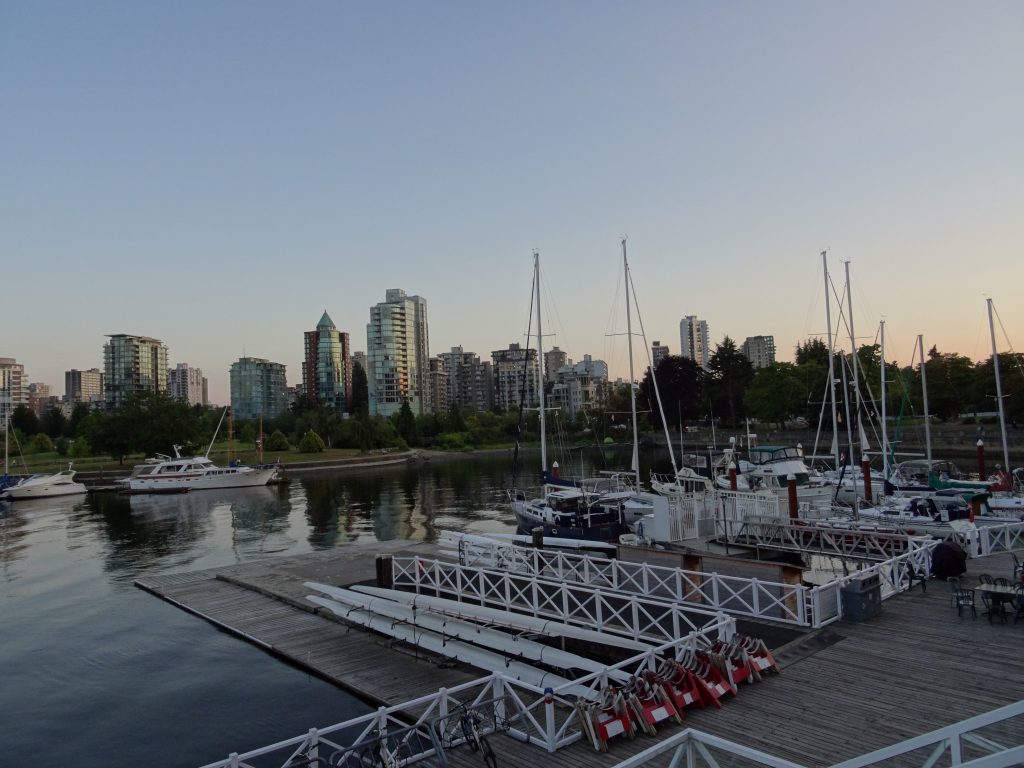
It took me a little longer to find a job in Vancouver than other cities I lived in as Vancouver employers really favor local experience. This is why I recommend signing up with a Recruitment Agency (we used Randstad and Stellar) to get your foot in the door.
The minimum wage in Vancouver is $17.40 CAD per hour so you’ll likely be earning close to that amount unless you are highly skilled. FYI, tech jobs tend to pay the most here. I will add, that the big downside for us when working in Vancouver was the measly 10-day annual leave and 0 paid sick days. That was just the jobs we worked whilst there, so I can’t speak for them all.
In short, you may not nab your dream job first, but it’s important to get on the job ladder because once Canadian employers see relevant local experience, you’re instantly more ‘hireable’.
One of the best websites for job searching in Vancouver are
Related Read: If you’d like to move to Canada but are keen to experience somewhere different why not consider living in Whistler. This magical mountain town is one of the best ski resorts in the world and is equally as beautiful in the summer.
Renting in Vancouver
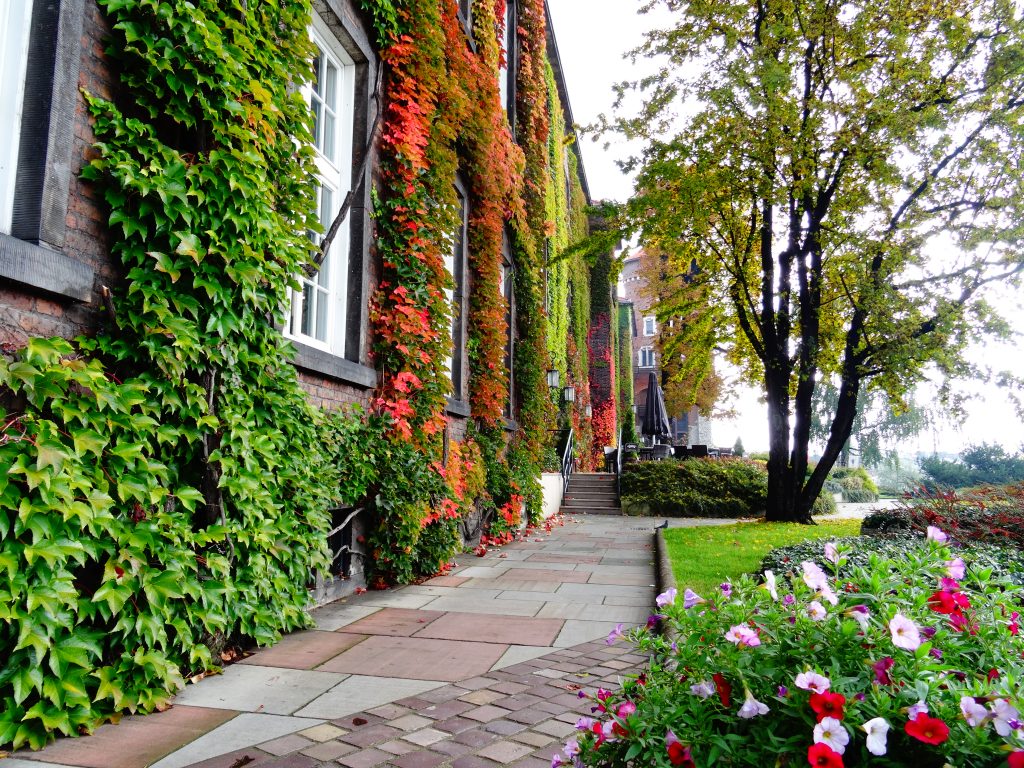
Rent is expensive in Vancouver, and the demand far outweighs the supply – so, it’s, sadly, a landlord’s market here. We found our apartment by walking around the area we wanted to live in (Westend in Vancouver), and if an apartment block had an apartment available to rent, they would display it on a board outside together with a number to call.
We suggest signing up with letting agents like Vancouver Rental Agency or Orca Realty as soon as you arrive, so that you get notified of any rental properties to hit the market. Other good websites for renting are Padmapper and Craigslist.
The most desirable areas to live in Vancouver for ex-pats include Westend, Kitsilano, and Yaletown. So, as such rent is higher in these neighborhoods – expect to pay around $3,000 CAD for a one-bedroom here. Alternatively, you could move out to cheaper areas like Surrey or Langley where the average rent sits at between $2,200 to $2,500 CAD per month.
Because the competition is fierce, be sure to come prepared for a rental viewing in Vancouver. The documents you should have at every rental viewing include:
- A form of I.D like your driver’s license, passport, and your SIN (Social Insurance Number)
- References from past landlords
- A current work reference
- A current payslip or bank statement that shows your income
The best areas to rent in Vancouver
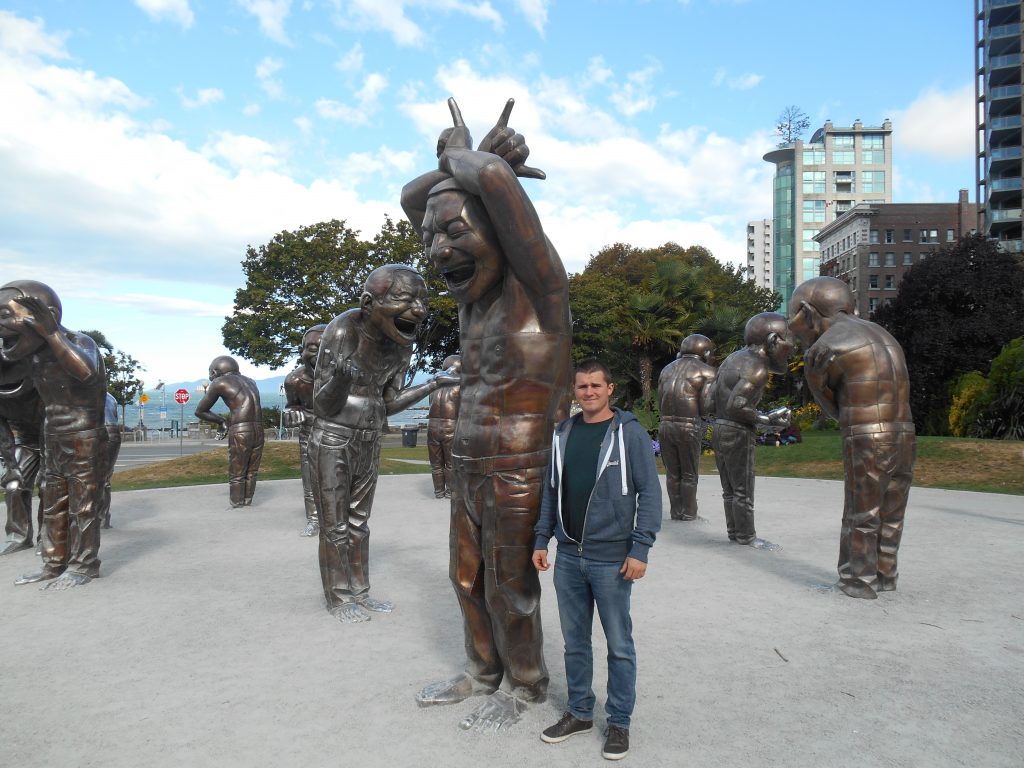
Westend –
This is where we lived when we first moved to Vancouver, it’s classed as downtown and borders both Stanley Park and English Bay (a lovely beach). It’s a very culturally diverse neighborhood with lots of great Cafes, restaurants and several supermarkets. There’s a varied mix of homes to rent here, but you’ll most commonly find older high-rise apartments for rent in the Westend. Expect to pay around $2,500 CAD per month for a one-bedroom apartment here.
Yaletown –
This is perhaps the most affluent and trendy neighborhood to live in downtown Vancouver. You’ll find warehouse-converted lofts for rent here. And there are some great restaurants, bars, and nightclubs here. It’s pricey to rent in Yaletown, though, yep, you’re looking at around $3,000 CAD for a one-bedroom apartment.
Kitsilano –
One of my favorite neighborhoods in Vancouver, Kitsilano, or ‘Kits’ as the locals call it, is similar to the Westend, but it has more of a relaxed/beachy vibe. There are two awesome beaches here – Kitsilano Beach and Jericho Beach, and there are also some really trendy coffee shops and vintage stores here. Expect to pay around $2,200 -2,500 CAD per month for a one-bedroom here.
Burnaby –
Is a city in it’s own right, and it’s a 15-minute drive from downtown or a short ride on the SkyTrain. It’s very multicultural, and because it’s a city, as you can guess, there are heaps of supermarkets, restaurants, Cafes, etc. here. It’s one of the cheapest places to rent close to downtown, expect to pay around $2,700 CAD per month here.
North Vancouver –
Nestled at the base of the North Shore mountains, this is one of the ‘prettiest’ areas in Vancouver. Well, North Vancouver is actually a city like Burnaby above. It’s close to Grouse Mountain and the Capilano Suspension Bridge and has a large shopping center. Plus, it’s a very family-friendly place to live. However, North Van is expensive, you’re looking at a median rent of $3,200 CAD here.
Important information once you’ve arrived in Vancouver
- Apply for a SIN (Social Insurance Number) – You should apply for your SIN as soon as you arrive in Vancouver as you will need this to get a job. Your best bet is to apply at any Service Canada office. There is no charge for this. You will need to show your work permit and provide an address (it’s okay to use your hotel/hostel in this instance). Your SIN should be issued on the spot.
- Set up a bank account – We set up our account with TD Bank (and got a free iPad, it was an offer they were running at the time) other popular banks in Canada include Royal Bank of Canada and Vank of Nova Scotia. To set up an account as a non-Canadian you will likely need to visit the bank in-person and provide two forms of i.d and a proof of address.
- Get a Compass Card – If you’re going to be using public transport a lot, i.e. if you’re not living in downtown Vancouver, we recommend getting a Compass Card – a reloadable fare card that you can use within Metro Vancouver.
Best short-term apartment rentals in Vancouver
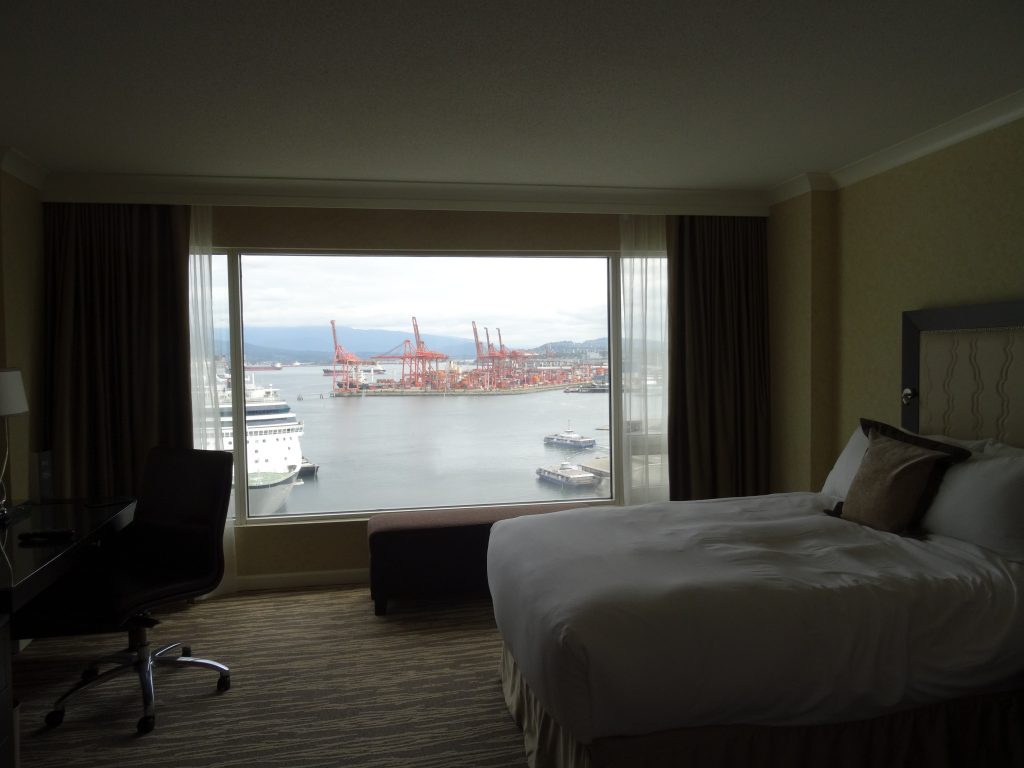
We recommend (if your budget allows) renting a cheap short-term apartment whilst you look for suitable long-term housing – here’s a list of some apartments we recommend (they’re all very well-rated) –
- 1-Bedroom + Den in Downtown – Located in the West End, a short distance from English Bay and Sunset Beach, this one-bedroom everything has everything you’ll need to start off your life in Vancouver. From a fully-equipped kitchen, flat screen TV, free WiFi, free parking, and laundry facilities. There’s also a balcony with sea views and a BBQ. Expect to pay around $1,300 CAD per week for this.
- Chic 2-Bedroom Apartment – This chic, urban two-bedroom apartment is located in the center of Vancouver – just 500 meters from the Waterfront Center Mall. It offers a fully-equipped kitchen, two bathrooms, air-conditioning, WiFi and it’s so stylishly decorated. There’s also a balcony with great city views. Rates start at around $2,000 CAD per week.
- Condo in Downtown – This one-bedroom apartment in the West End is 400 meters from Sunset Beach. It offers a fully-equipped kitchen, WiFi, free private parking and you have access to the building’s swimming pool. The average weekly rate here is $2,000 CAD.
Best hostels in Vancouver
Another great (and much cheaper) alternative is to stay in a hostel until you find a rental property. Hostels are a great way to meet people and all the hostels I’ve listed below are well-rated:
- HI Vancouver Downtown – This hostel on Burnaby Street has a fabulous rating on HostelWorld (8.8/10) and is located on a quiet street in the West End. It’s a short distance to Stanley Park and English Bay, and the dorms here are small (just 4 beds per room), and all have lockers. You can also book a private room here with a shared bathroom. Expect to pay around $44 CAD for a bed in a dorm here.
- HI Vancouver Jericho Beach – Another HI hostel, this one is located in the lovely neighborhood of Kitsilano, just steps away from the famed Jericho Beach. Again, it’s rated excellently (8.6/10), and you can choose from a private room or bed in a mixed dorm. There are mixed, male or female dorms here – each with 18 beds. A bed in a dorm starts from $36 CAD per night.
- Cambie Hostel – Seymour – Located in central downtown, this hostel is clean, safe, and has super-friendly staff. There’s also an on-site restaurant called Malone’s, and when you stay here, you’ll get a discount to eat there. There are lots of room types here, including a 2-bed female or male dorm. You’ll be paying around $26 CAD per night for a dorm bed here.
Thanks for Reading!

I hope this detailed blog has helped make your mind up about moving to Vancouver. Honestly, we loved our time living in Vancouver – it’s such a beautiful, friendly city with so much to do!
Before you go! You may also enjoy reading some of my other most popular blog posts, including –
What It’s Really Like to Live in Whistler for a Ski Season
Luxury Travel Guide for Whistler (By a Local)
Best stops on the Drive from Whistler to Jasper
15 Best Stops on the Drive from Whistler to Banff
Last Updated on January 10, 2025 by snaphappytravel
